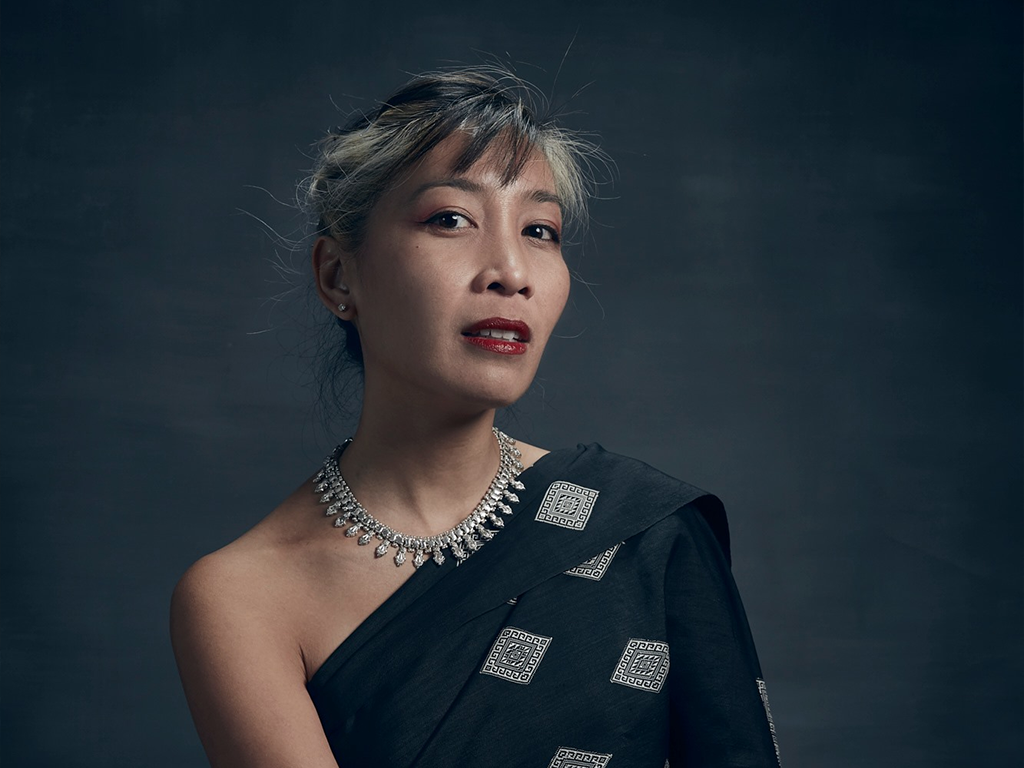When I take the time to conduct an interview and review a film, you know the hype is real. I loved "The Long Walk" (2019) so much that talking with director Mattie Do was a must. She is one of those people with no filter, which is much appreciated in this age of carefully crafted public personas. Talking with her felt like catching up with a friend, even though we had never met before.
Do is the first (and only) female Lao filmmaker and "The Long Walk" is her third feature. Her first feature film, "Chanthaly" (2012), is based on the ballet, "Giselle" and is available for streaming on YouTube. Her second feature, "Dearest Sister" (2016) is currently streaming on "Shudder." In this interview, we touch upon all three of the films, but spoilers are only present for "Dearest Sister" and "The Long Walk." In the first part of the interview, we discuss Do's unconventional path to filmmaking, her hatred for mystic Asian art house movies, and her working relationship with Chris Larsen, her husband and the writer on all of her films. Please note that this interview has been edited and condensed for clarity.
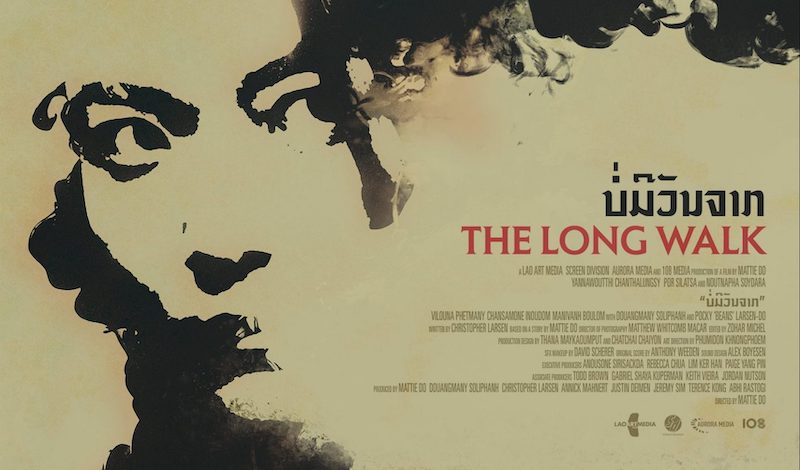
Woman in Revolt: What was your path to filmmaking like?
Mattie Do: There wasn't one. I sometimes feel guilt because everyone thinks there's some kind of determined path. I see a lot of film school students develop this douchey behavior where they believe [there is only one] way to become a filmmaker. I don't know if it's school that teaches them this hustle attitude and the [idea that] you have to keep the right crowd, kiss the right ass, go to the right parties. That's definitely not how I became a filmmaker.
Of course, when you are surrounded by other people who make films, it's easy to be in the right place at the right time — to pitch your project or to find like-minded individuals. But I didn't have the school experience. I went to a film festival once when I was a ballet student. I was one of those outsiders that got a ticket, but I didn't have the badge and couldn't go watch multiple films. I watched the one film I had a ticket for and thought it was a strange environment. I didn't go to film festivals as a festival person until I made my first film. I don't believe in the path that everyone has assumed [you need to have for] a career in film.
I was influenced by film when I was in Italy because I was working as a makeup artist [on film sets], but it wasn't because I wanted to do anything related to film. In fact, I really disliked being a makeup artist. Doing makeup was a way to pay for my ballet education and gear. Back then, I had no desire or inkling to work in film at all, but it was great because I learned a lot while I was there. I wasn't focused on it, though. When I made my first film, even to this day, I still have problems with not knowing basic terminology because I didn't go to school. My path to filmmaking was first, luck. Pure blind fucking luck.
What brought you to Laos?
I first came to Laos to be with my dad because I thought he was going nuts and needed a caretaker. He married a woman that was younger than me out of the blue. We were like, "Oh, shit, dad's gone off the rails. Maybe someone should go check on him." My husband [Chris Larsen, Do's collaborator] and I were the only ones who didn't have "real" jobs because we were artists, so we were assigned the role of coming to Laos to see what dad was up to.
OK, so now you're in Laos with no filmmaking experience, checking in on your dad. How do you start making films?
Chris was always someone who desired to work in film. He worked at the film school where I was working as a makeup artist [in Italy]. When we got to Laos, he noticed that there was not much happening in terms of film. There seemed to be only one production company, but [we didn't know if it still existed]. This random white dude we met in a cafe invited us to a press conference/party for Laos' first film festival. He was like, "You should come." And we're like, "We don't have an invite," but he insisted that no one would care and that's how I met Lao Art Media.
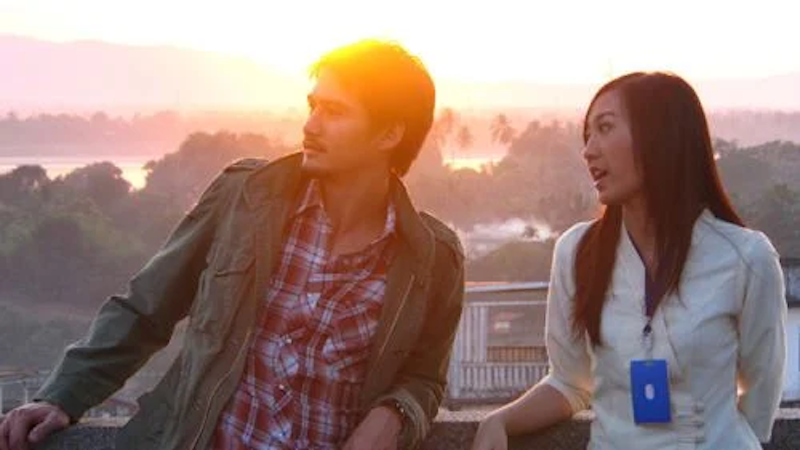
They were fucking plastered at this party, but when we expressed interest, they were like, "We have an office with Wi-Fi. Come over tomorrow when we're sober and we can talk about it." The next day, we got there and they said, "Here's your office." Chris told them that he could write any story they wanted and they were like, "Cool. Because we're too old and we aren't comfortable making films anymore. We would rather produce and just bring together the people to make a Lao Art Media film."
They didn't realize that Chris was a writer with no interest in directing. They're like, "What do you mean you can't direct? You told us you were a filmmaker." This made them very depressed, so Chris told them that maybe I could do it because I have a lot of experience in performing arts, which is not a lie ... I taught many seven-year-olds ballet (laughs). I drank all of their whiskey and then when we got home, I had the biggest blowout fight with Chris ever. Like, "Are you fucking insane? I can't make a movie. I don't even watch movies!" He told me that it was OK and that I just had to read this thick-ass book called "Directing." I was super annoyed, but I read it, and then I made a film and became a filmmaker.
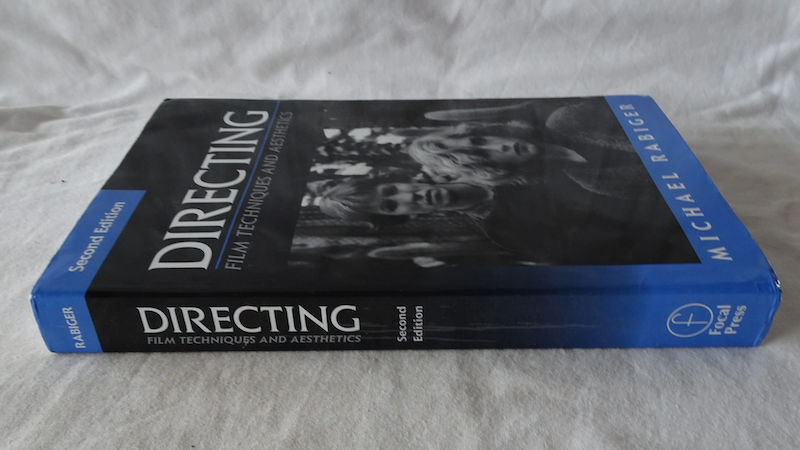
After you got involved with Lao Art Media, did you know that you were going to stay there for a while?
We were never really sure, but [at this point, we've been in Laos] for more than ten years. It helps that my dad is here and that we made a lot of friends quickly. People in general are very friendly and open. And of course, when you're working with a company like Lao Art Media, they become your friends. We decided to see how it went with them before going back [to Italy]. I actually held my position at the ballet school. I replaced myself with another teacher and told them I would be back. Two years passed and I just kept talking to them. When "Dearest Sister" was in progress, I had to call the school to finally tell them that I wasn't coming back. They were like, "Yeah, we didn't think so."
What did you learn while working on your first film, "Chanthaly"? And what was it like to work with Chris?
I give him the ideas and then together, the two of us build off of it. It's pretty easy. Not for him, I mean. Of course, he has to put the hours into making it a script. But for the development, I think it's quite easy because we live together, so we're talking about it 24/7.
The idea for my first film was very basic for me, because I was coming from a non-film background and Chris suggested I do something familiar so that I wouldn't be overwhelmed. I chose to do ballet. If you know ballet, then you realize that my first film was a Lao adaptation of the ballet "Giselle."
This is going to sound silly, but what I learned most on this film is that you don't know what you don't know. The problem I have with a lot of those film students who think there's a defined path to becoming a filmmaker is that until you've made your first feature, gone to festivals, spoken to sales agents and distributors and production companies, you are clueless. Until you experience it, it's hard to understand how much work there is to do after you're done making a film. You have to be able to create a film DCP [digital cinema package]. You need separate soundtracks and sound stems. Subtitle files must be coded in a certain way. The list is fucking crazy, even for a small independent film.
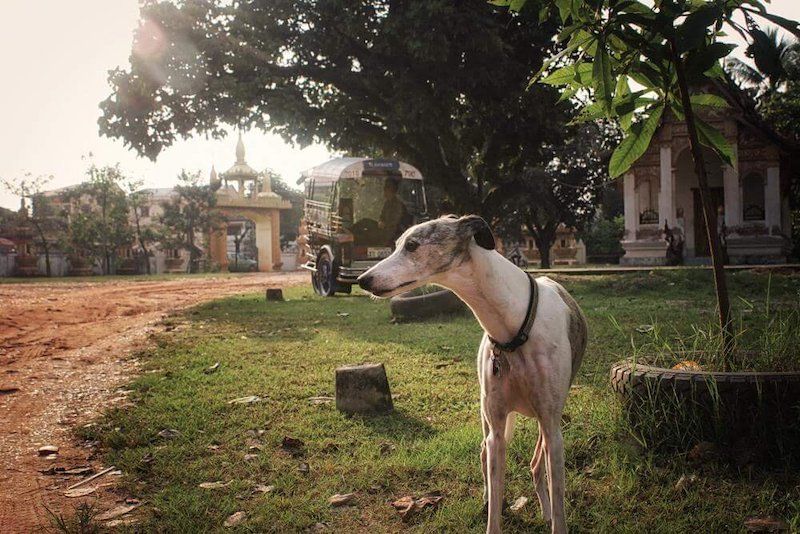
I listened to another interview with you where you were talking about how you made "The Long Walk" as a "fuck you" to art-house cinema after getting so much pushback with "Dearest Sister." Can you talk about that?
There were all of these fucking people [harping on] authenticity, who are usually not Lao, by the way. They're the ones who leave weird Yelp reviews about how authentic something is or isn't. I had this experience where some white person said "Dearest Sister" wasn't authentic, even though it [accurately] portrays Vientiane life. I live in the capital city. Yes, it's a developing country, but as you see, I'm on a fucking Zoom call with you. I obviously have internet and a device that can connect to it. My house has cement walls, but I'm also an artist and not living in an expensive neighborhood.
When I showed this life in Vientiane with Ana (Vilouna Phetmany), a wealthy girl who had a foreign white husband with friends who were even wealthier and had servants [it wasn't what people expected from Laos]. In the film, Ana's cousin, Nok (Amphaiphun Phommapunya), comes to live with her from a rural village in the middle of nowhere. She gets entranced by money and attracted to the glamour of material life in Vientiane. She sees how fancy Ana is with her white, blonde husband and wants that for herself without any context for what it really means. It was a lot like "Pretty Woman" (1990).
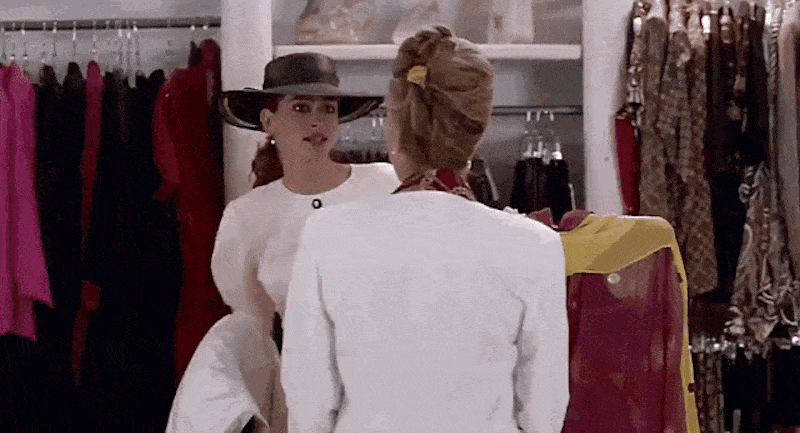
Is it just that certain people can't accept the fact that developing countries still have pockets of wealth or ...?
[In "Dearest Sister," Nok] becomes greedy and obsessed. That rubs the whities that love authenticity so wrong because their image of the country girl from Laos is a sweet, innocent noble savage. They said it wasn't authentic because they have this gorgeous house. I think they wanted a hut. Those places do exist, but that isn't life for everyone, and it's especially not like that in Vientiane.
That's not the story I was trying to tell, but these people who had never been to Laos, can't speak the language, and don't know anything about the culture have the balls to tell me that my film wasn't authentic because it didn't suit their noble savage vision. It didn't suit their "Look at these sad brown people and their developing world country" vision. I was just like, "Okay, fine. Let's give you your poor, sad brown folk, let's give you your little hut and dirt road. Here's some Asian mysticism. It's true, we believe in it ... but it's going to be done on my terms. So like, fuck you! It's a [time travel] serial killer movie now."
I'm always interested in how artists structure complex stories. Was the time travel element difficult to figure out in "The Long Walk"?
We didn't immediately set rules, but we started thinking about all of the different time travel scenarios we had been presented with, like "Looper" (2021), "Back to the Future" (1985), and "Primer" (2004). The "Back to the Future" model worked really well for us because [those characters] didn't retain the memories of how their future or past was affected. If they've gone back and disturbed their past or made some kind of change, they're still that person but have no memory of what happened. It's like they didn't actually live that life. Like all of a sudden, there's Marty McFly, super rich and living in a huge house, but his parents are not his original parents.
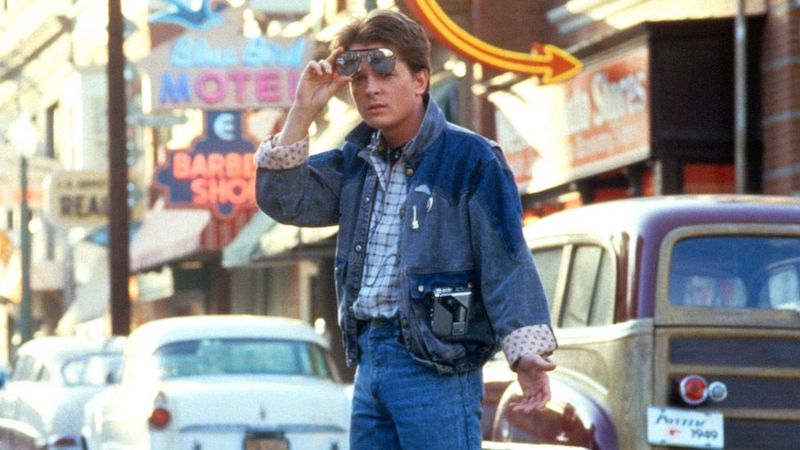
I could tell that you had rules but that time wasn't linear. I didn't feel like I fully understood it until the second watch.
One of the most interesting things about the rule we set was that it's a spiraling timeline. It's not point A to point Z like most white people time travel because we believe in reincarnation. It's the idea of rebirth, that if you don't have a good death and you don't have ceremonial rites performed for you, that you might be stuck in this weird purgatory stage, like the ghost girl. Time does not travel the same for spirits as it does for humans. Something that feels like forever to us could be a snap for spirits because their lifespan is gone.
I liked your time travel approach. You gave some visual indicators that time travel had happened, like the cracked cabinet.
[Along with] the kerosene lanterns and real cigarettes.
Those signposts help the viewer orient themselves, but you don't overexplain anything. Were you ever tempted to be more explicit?
I wasn't tempted to overexplain anything because I don't like when films treat me like I'm stupid. My DOP (Matthew Macar) was super worried about that and sent me a version of the film that involved flashbacks, close-ups on certain things, dialogue inserts ... basically, different ways to pull people back to certain moments. I didn't like it, but he was worried because he comes from an L.A. system and thought the general audience wouldn't get it. To be honest, I was worried, too, but I wasn't going to change it because this is the way that I wanted to watch a film.
I kept thinking about what it would be like if I encountered this film as a senior in high school. It would be the first time where I didn't know what was going on and couldn't figure out why my friends liked the film. Later, I'd watch it on my own and would start to notice things and become obsessed with it. I would watch it over and over again and notice all of these details. That's what I wanted the film to feel like for someone watching it. I wanted them to realize that there are so many layers to it and that the world opens up more each time you watch it.
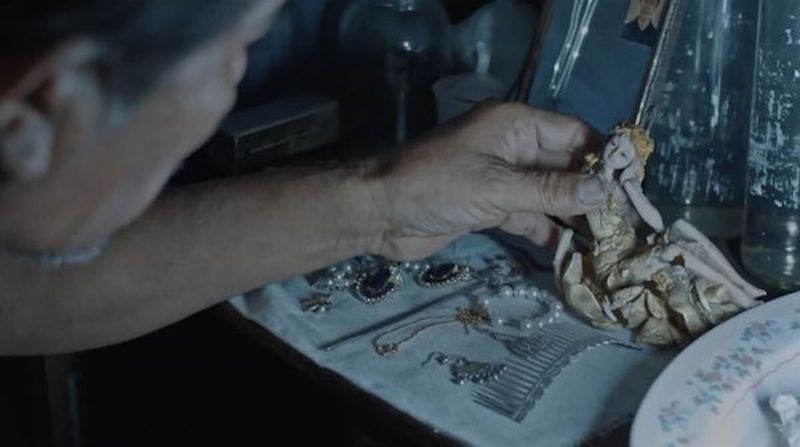
And it definitely does, which is impressive. It's hard to walk that line between creating a challenging film with a clear point of view and one that is complication masquerading as intelligence.
It's not vague! It's not like one of those art films that I described to you. I wonder sometimes if those films contain all of that symbolic, multi-layered, profound shit or if they're just having a fucking laugh at us. They're sitting there with their middle fingers up behind the scenes, like "Look at these assholes doing mental gymnastics to find meaning in my film. It's just a leaf fluttering in the wind." I think that because it's so "The Emperor's New Clothes." Everyone's like "bravo, bravo" and I'm like, "He's fucking naked up there."
In Italy, there's something they call the spiegone, which means "the big explain." They talk about how in the seventies, during those murder thrillers, like the giallos, there was always a moment when the detective or the killer had to do the big spiegone, as if we couldn't put it together ourselves. I find all of this exposition condescending and always roll my eyes at it. Filmmakers should find ways to immerse their audience in the story so that they can figure things out themselves. It's so much more satisfying that way.
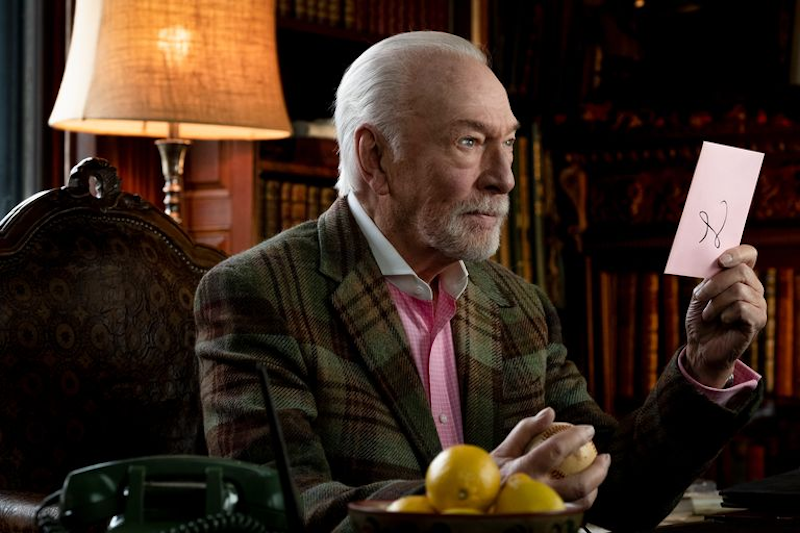
It's always better when you give the viewer clues but let them draw their own conclusions.
I also wanted everyone who watched the film to come out with a different experience. When The Old Man dies at the end of the film, it's not the same for me as it is for Chris. He believes that The Old Man dies when he takes the tea with The Girl and she gives him the last pill. For me, that pill was symbolic. That pill for me was like, "This is what you've done to all of the other women." The Old Man didn't understand that he died because he lost a lot of blood after being stabbed in the femoral artery. Then he burns the house down, falls down the stairs, runs out and trudges off to bury The Boy's bones with The Girl. How could he do that with that much blood loss?
For me, I believe that he had a bad death, so he wasn't aware that he was dead yet and couldn't accept it. When he goes out to the woods and sees The Girl, that's why she can finally talk to him. He can hear her because they're now in the same plane. They're in that weird undone world now, so she can talk to him and reveal that he's dead. She offers him the tea and then they go their separate ways. For me, he died when he opened his eyes and saw his old house burnt up with a tree growing in the middle of it.
I was definitely more aligned with Chris when I first saw the film, but subsequent viewings made me think about it differently.
I've learned, having taken the film to many different countries, that a lot of Occidental people feel like Chris, who is white. A lot of Asian people feel like me because of our beliefs in the dead and dying and how people move on. I found that fascinating. I want to make films that stay with people. I hate when I go into one of those films with all the hand-holding and fluffiness, and then walk out and don't even remember what I watched. I remember going with my dad and his wife to see some superhero film. I don't even remember if it was a Marvel or DC film. After it was over, while we were at dinner, we started talking about the film and realized that we couldn't recall much of it, even though we sat there, engaged in the dark. That's not the film I want to make.
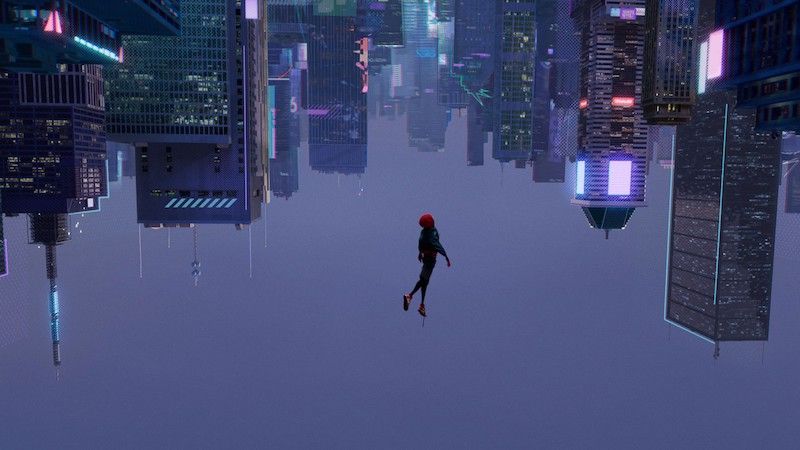
"The Long Walk" might be the first film I watched where I had a weird amount of empathy for a serial killer. I think it's because of his childhood.
He's not a good child, either!
No, he's definitely not. And on rewatch, he became even more sinister to me in general because I knew what was coming.
I do have empathy for him, though, because there are a lot of issues that he deals with as both a child and an adult ... like human condition issues. As a character, I designed him as someone who had no control over his own life from childhood. [Killing people] is him exerting control, but it's terrible. He's oppressing women. He's not asking them to stay with him afterwards. He's not asking if they need him to take care of them or help alleviate their pain. He's taking it upon himself, but he also feels like this is the amount of control that he can exercise because from a young age, he's had no control.
The only time he felt like he had some control was when he invited the ghost girl to walk with him as a child. Even then, when he's confronted by her mother, he looks her in the face and deceives her. The ghost's face is like "That little shit just lied" and is heartbroken over it. She sees [those qualities] in every iteration of his life as he's reborn again. He's not really improving and continues down this cycle. You don't ever know how bad he was in other iterations and how far he escalated, but I do believe that the escalation was the greatest in the lifetime that we saw ... where he murders all of these young women and becomes an awful serial killer. It's also the only time that he's killed himself.
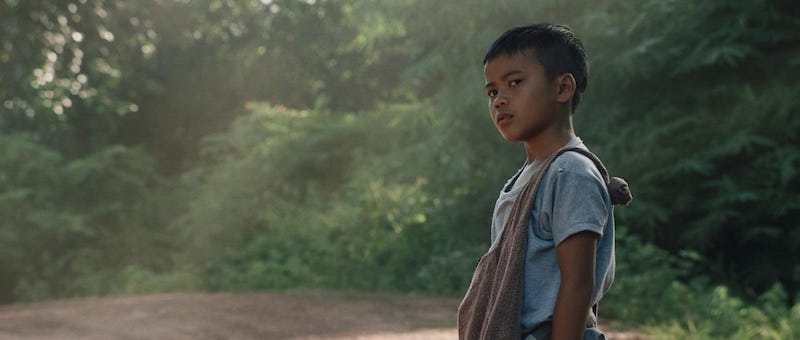
The scene with the ghost girl's parents kills me. After they drive off, he turns to her and says, "I didn't know you had a dog."
He's so oblivious! I love that line because it shows how that's the only thing affecting him.
You set up that dichotomy really well, where you feel empathy for The Boy and The Old Man while understanding that there's a villainous aspect. And you obviously feel empathy for the women who were mercy-killed without their consent.
"Dearest Sister" is a film that I worried about because none of the characters are sympathetic. Nok starts out quite sympathetic because she's a cute country girl, but she spirals into this toxic materialism. You're cringing the whole time as she makes one bad decision after another. With Ana, you start out not really liking her because she's a condescending snob and doing this whole superior madam thing because she feels self-conscious about being disabled. She has to exert herself as the woman in charge of the house, so you're not sympathetic to her. Everyone in [the] film [world] always talks about having a sympathetic character, so I was worried it wouldn't work. Only the NGO guy, Kenji, is sympathetic in "Dearest Sister," and he's not a main character.
What do you think makes "Dearest Sister" work even though it doesn't have likable characters?
They're not obnoxious, so that helps. I think that the problems and the mistakes they make are things we can all relate to. Who hasn't had the urge to buy things they can't afford? Everybody wants to status climb a little bit. I think that's what makes the unlikable characters carry the film well. Even if it's in a different country with a different culture and language, there are enough universal moments where it's easy to envision yourself in their position. But then, it's pushed to the extreme. And that extreme, where Nok locks Ana in the house "Misery"-style, feels unrealistic enough that you don't have to relate. From that point on, it's more about watching to see how it all plays out.
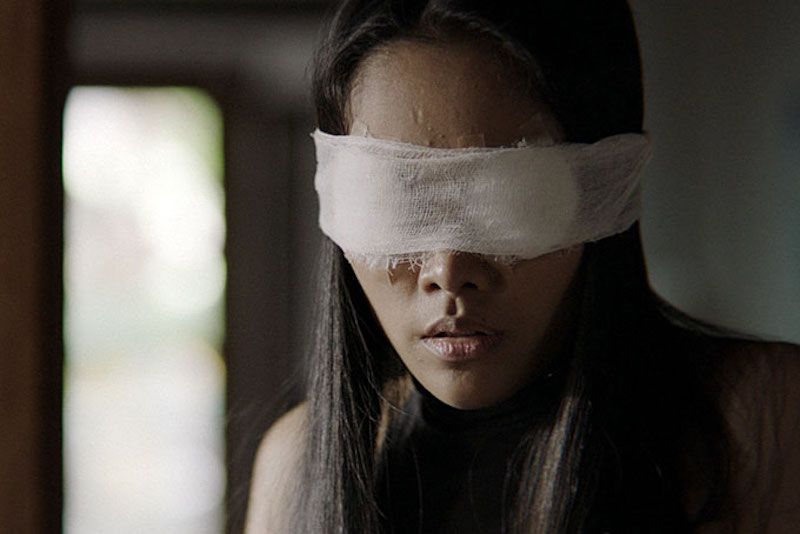
In "The Long Walk," would you say that The Old Man and Lina (Vilouna Phetmany) grew legitimately close, at least in the version where they live together?
In that version, they had a beautiful relationship. Immediately after she leaves with her girlfriend, she's like "I made you dinner." Then, as a joke, leaves ₭400,000, which at the time was $50. Now it's only like $40 because we have massive inflation. [And now, since it took me so long to transcribe this interview from last month, it's only $30.] He almost puts the money in the case as a souvenir with his serial killer conquests, but then he's like "Fuck. I need this money" and pockets it.
In the next scene, he had dinner, picnic style, in his secret cemetery surrounded by those eight or nine old women. It's so tragic to me because he's sitting there in silence, eating next to these shadowy women who can't interact with him in any way. He realizes that Lina was the closest thing to a friend he's ever had because she was actually alive. Aside from his mom, he's never really known companionship like that.
I don't know if I'm reading this right, but I felt like Lina anticipated some judgment or apprehension from The Old Man when she brought her girlfriend to his house. He didn't really exhibit it, though.
I don't think she thought he would judge her, but that it would be awkward. She comes in and has everything all planned out where she goes to make dinner and leaves [her girlfriend] alone to talk [with The Old Man]. It's almost like a moment of meeting the parents, but not quite because he isn't her dad.
Maybe she thought this new person would throw him off because they had never talked about relationships before. The Old Man and Lina have a relationship, but it's not love and she could leave at any time. She's springing this information on him and it's almost like her past life is coming back to haunt him. And then she does actually leave the next day and is the one who sort of feels bad.
There's a moment where the girlfriend tries to leave and The Old Man tells her to stay because it's already dark and they're in the middle of nowhere. The two women are getting really cuddly together and talking sweetly to each other but at the same moment, they're noticing that he's watching them and they're afraid he's feeling awkward. It's more like that, but no judgment.
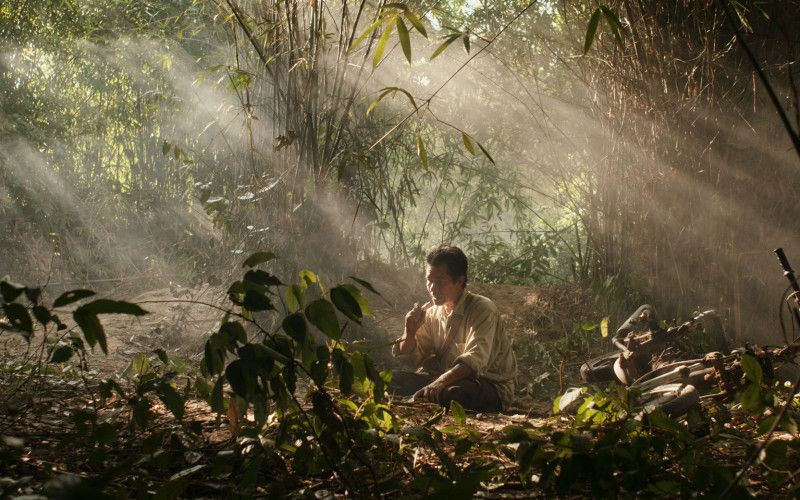
She understands that he's a hermetic person who isn't going to love having his solo routines interrupted.
She's already been a disturbance by moving into his house and now she's going to further shake it up by introducing a girlfriend and leaving with her. That was actually kind of a statement, too, having the girlfriend. There is a weird Western judgment thing where a lot of people assume that because we're a third world country, we're a conservative country. That because we're very religious, very traditional, we would be homophobic. They're always coming here trying to teach us about homophobia and gay rights. They want to do a pride parade and blah, blah, but we don't need one. Like, don't bring your Western problems on our Eastern soil because we've accepted LGBTQ people for centuries. We think Americans are backwards.
The woman who played the mom character (Chanthamone Inoudome) was so confused when she saw on the news that a Black trans woman got murdered. I had to explain to her that [in America] they don't like trans people. She couldn't understand it because being trans in Laos is completely normal. In fact, we can tell you're trans even if you still look like your birth sex because of the way you speak. We have gender denominations for referring to ourselves. If you refer to yourself as a woman, then OK, you're a woman. Nobody questions it. I think it's because we believe in rebirth. There's this theory that you were born into the wrong body, so your spirit is still a woman even though you were born as a man, for example.
Much like the futuristic elements, the queer couple gave the film some context for place without making a big overt statement. The NGO workers who came to install the solar panels served the same function.
I think it's important because I'm not making a documentary, but I want people to see my perspective, too. So often, films from here aren't from the perspective of the locals. If they are, it's a local trying to do something to please a Westerner because they think that's what they want to see. I'm not here for that.
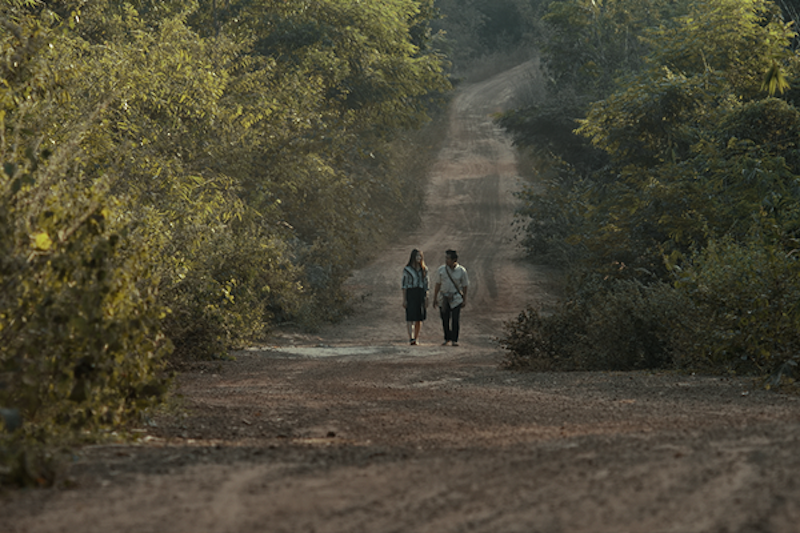
What's next for you? Do you have anything currently in the works?
I have three films, actually. A thriller crossed my desk and the producers have been amazing and let me completely revamp it. Before, it wasn't a thriller but something light about a woman trying to find her lost baby in the Philippines. Chris and I are rewriting it and setting it in Thailand and Laos, places that I actually know. I wanted to interject my own perspective. I felt like a lot of it was through the lens of a white person living in Asia, and I'm not interested in that. I wanted it to be more like a commentary on expat white privilege.
It starts out as a straightforward thriller and in the end, turns out super dark. It makes people think a bit about their role in another country as foreigners. Chris is almost done with the draft. It should be fun to make but hard to cast because I think a lot of actresses aren't going to want a role where they're seen in this ultra-privileged, insensitive light. Like neo-colonists, basically.
I'm also making a love story that's super fucked up. And then another movie that's a creature feature about a sexpat that gets accidentally killed by these loud little kids and comes back to terrorize them.
Your films all have these dark elements that can be read as deeply cynical or positive, depending on what kind of person you are. I'm more of a cynical person, but I can see other viewpoints, too. The films I want to watch and write about are ones like yours that spark conversation and open up radically different perspectives depending on who's watching.
I'm a deeply cynical human being. You wouldn't know it if you hung out with me. I'm very happy, but I have cynical views. It's not that I think everyone's out to get me or that I'm cynical about other people; I'm just cynical about life in general. I believe that life is extremely short and we should always anticipate the worst. When I make a movie, I think that I push my cynicism to the extreme. All three of the new projects that I'm working on are dark and disturbing. I worry that because of the pandemic, people aren't going to want to watch them, but these are the stories I love to tell.
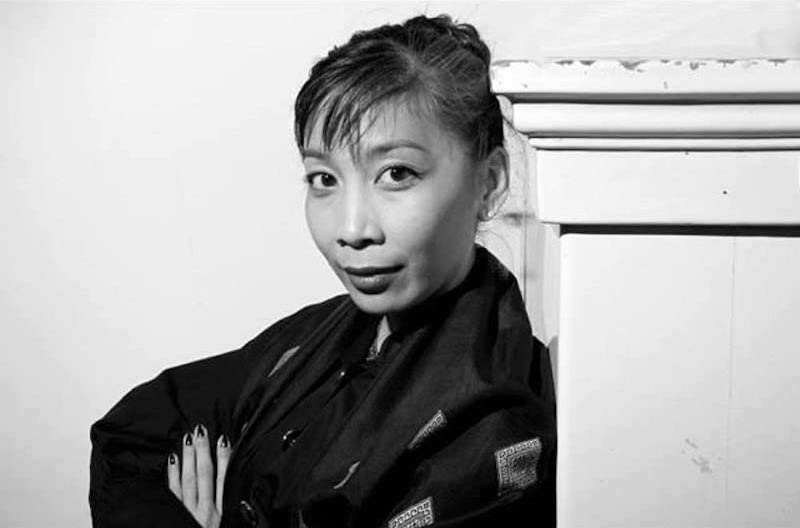
If you want to keep up with Mattie Do's new projects, and especially if you love animals, I highly recommend following her Instagram. Her sweet cat Starling got injured right before we spoke and I've been very invested in her recovery.

